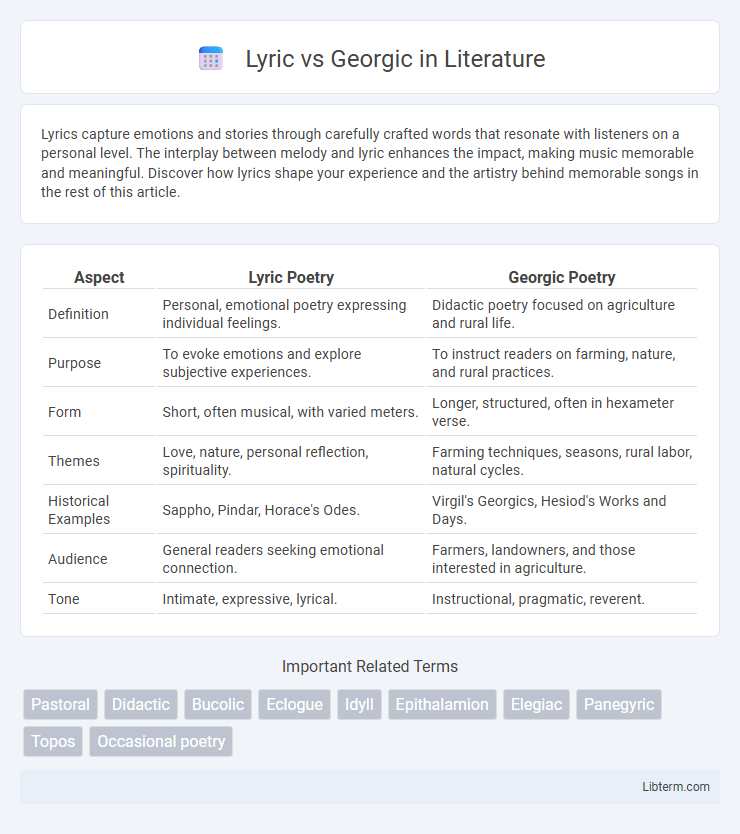Lyrics capture emotions and stories through carefully crafted words that resonate with listeners on a personal level. The interplay between melody and lyric enhances the impact, making music memorable and meaningful. Discover how lyrics shape your experience and the artistry behind memorable songs in the rest of this article.
Table of Comparison
| Aspect | Lyric Poetry | Georgic Poetry |
|---|---|---|
| Definition | Personal, emotional poetry expressing individual feelings. | Didactic poetry focused on agriculture and rural life. |
| Purpose | To evoke emotions and explore subjective experiences. | To instruct readers on farming, nature, and rural practices. |
| Form | Short, often musical, with varied meters. | Longer, structured, often in hexameter verse. |
| Themes | Love, nature, personal reflection, spirituality. | Farming techniques, seasons, rural labor, natural cycles. |
| Historical Examples | Sappho, Pindar, Horace's Odes. | Virgil's Georgics, Hesiod's Works and Days. |
| Audience | General readers seeking emotional connection. | Farmers, landowners, and those interested in agriculture. |
| Tone | Intimate, expressive, lyrical. | Instructional, pragmatic, reverent. |
Introduction to Lyric and Georgic Poetry
Lyric poetry emphasizes personal emotions and thoughts, often expressed in a first-person voice and characterized by musicality and brevity. Georgic poetry focuses on agricultural themes, blending practical farming advice with moral and philosophical reflections, exemplified by works like Virgil's "Georgics." Both genres offer distinct approaches: lyric poetry explores individual experience, while georgic poetry connects human labor to the natural world and societal values.
Historical Origins of Lyric and Georgic
Lyric poetry originated in ancient Greece around the 7th century BCE, performed with the accompaniment of a lyre, and primarily expressed personal emotions and thoughts, contrasting with epic narratives. Georgic poetry stems from Roman poet Virgil's work in the 1st century BCE, emphasizing agricultural themes, farming practices, and rural life with practical and instructional content. Both forms reflect distinct historical contexts; lyric's roots lie in individualistic and performative traditions, while georgic embodies didactic and communal aspects tied to agrarian society.
Defining the Lyric Form
The lyric form is defined by its expression of personal emotions, thoughts, and reflections, often conveyed through a first-person perspective in a concise, musical structure. Unlike the Georgic, which centers on practical agricultural instructions or rural themes, the lyric prioritizes emotional depth and imagination, creating an intimate connection between the speaker and the audience. Key features include a rhythmic cadence, vivid imagery, and thematic concentration on love, nature, or individual experience.
Defining the Georgic Form
The Georgic form is a poetic genre rooted in didacticism, originating from Virgil's "Georgics," which focuses on agricultural themes and practical instruction intertwined with moral reflection. It employs a structured, narrative style that explores rural labor, farming techniques, and the relationship between humans and nature, distinguishing itself from the more personal and emotional expression typical of Lyric poetry. This form emphasizes the utilitarian value of poetry, aiming to educate and inspire through detailed, vivid descriptions of the natural world and seasonal cycles.
Key Themes in Lyric Poetry
Lyric poetry emphasizes personal emotions and intimate reflections, often exploring themes of love, nature, and individual experience. This genre uses vivid imagery and musical language to convey the poet's inner feelings and moods. In contrast to Georgic poetry's instructional and agricultural focus, lyric poetry centers on subjective expression and emotional depth.
Key Themes in Georgic Poetry
Georgic poetry centers on themes of agriculture, labor, and the harmonious relationship between humans and nature, emphasizing practical knowledge and rural life. It often explores the cycles of seasons, cultivation techniques, and the moral virtues tied to farming and perseverance. This genre contrasts with lyric poetry by focusing on communal and instructional content rather than personal emotion or individual expression.
Style and Structure: Lyric vs Georgic
Lyric poetry emphasizes personal emotion and individual expression, often utilizing concise, rhythmic lines with varying meters and rhyme schemes to evoke intimate moods. Georgic poetry, rooted in didactic tradition, employs formal, steady rhythms and structured stanzas to convey practical agricultural knowledge and moral reflections. The stylistic contrast lies in lyric's fluid, subjective tone versus georgic's instructional, objective narrative framework.
Notable Poets and Examples
Lyric poetry features notable poets such as Sappho, whose intimate and personal verses exemplify the emotional intensity of the form, and John Keats, known for his rich sensory imagery and musicality. Georgic poetry, focused on rural life and agricultural themes, includes Virgil as a prominent figure with his "Georgics," a didactic poem that blends practical farming advice with mythological elements. While lyric poems emphasize individual feelings and personal reflection, Georgic works provide a structured narrative rooted in nature and labor.
Influence on Modern Literature
Lyric poetry's emphasis on personal emotion and subjective experience has shaped modern literature by inspiring introspective and emotive narratives. Georgic poetry's focus on rural life and practical wisdom has influenced contemporary works that explore environmental themes and pastoral settings. Both forms contribute to modern literature's diverse narrative techniques by blending emotional depth with realistic depictions of nature and labor.
Conclusion: Lyric or Georgic – Which Resonates Today?
Lyric poetry endures today by capturing intimate emotions and personal experiences with expressive language that resonates deeply with contemporary readers. Georgic poetry, emphasizing practical themes of agriculture and rural life, appeals mainly to niche audiences interested in environmental and pastoral subjects. The lasting relevance of lyric poetry stems from its universal exploration of human feelings, making it more accessible and impactful in modern literary culture.
Lyric Infographic

 libterm.com
libterm.com